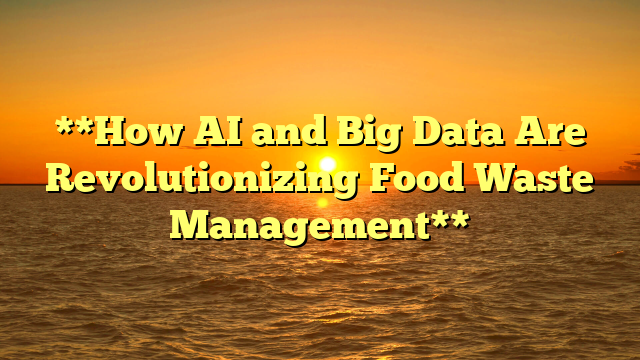
In the fight against food waste, technology is proving to be a game-changer. Artificial intelligence (AI) and big data are at the forefront of this revolution, offering innovative solutions to reduce waste across the food supply chain. From farm to fork, these technologies are enabling businesses and individuals to make smarter decisions, optimize resources, and create a more sustainable food system. By harnessing the power of AI and big data, we can tackle food waste more effectively than ever before.
One of the most significant ways AI is transforming food waste management is through predictive analytics. By analyzing vast amounts of data, AI algorithms can forecast demand for food products with remarkable accuracy. For example, grocery stores can use AI to predict how much of a particular item will sell on a given day, allowing them to adjust their inventory accordingly. This reduces overstocking and minimizes the amount of unsold food that ends up in the trash. Similarly, restaurants can use AI to optimize their menus and portion sizes, ensuring that they prepare just enough food to meet customer demand.
Big data is also playing a crucial role in improving supply chain efficiency. By tracking and analyzing data from every stage of the food supply chain—from production and transportation to storage and retail—companies can identify inefficiencies and implement targeted solutions. For instance, sensors and IoT (Internet of Things) devices can monitor temperature and humidity levels during transportation, ensuring that perishable goods are stored under optimal conditions. This reduces spoilage and extends the shelf life of food products, ultimately cutting down on waste.
AI-powered tools are also helping farmers reduce food loss at the production stage. Machine learning algorithms can analyze data from satellites, drones, and sensors to monitor crop health, predict yields, and detect signs of disease or pests. This enables farmers to take proactive measures, such as adjusting irrigation or applying targeted treatments, to protect their crops and maximize yields. By minimizing losses during harvest, farmers can reduce waste and increase their profitability.
Another exciting application of AI and big data is in food redistribution. Platforms like **Copia** and **Food Cowboy** use AI to match surplus food from businesses with organizations that can distribute it to those in need. These platforms analyze data on food availability, location, and demand to ensure that surplus food is redirected efficiently and effectively. This not only reduces waste but also helps address food insecurity in local communities.
Retailers are also leveraging AI to reduce waste at the consumer level. Smart shelves equipped with sensors and cameras can monitor product freshness and alert staff when items are nearing their expiration dates. This allows stores to discount or donate these items before they go to waste. Additionally, AI-powered apps like **Too Good To Go** and **Olio** connect consumers with surplus food from restaurants and grocery stores, making it easier for individuals to reduce waste in their daily lives.
In the hospitality industry, AI is being used to optimize food preparation and reduce kitchen waste. For example, **Winnow Solutions** has developed an AI-powered system that tracks food waste in commercial kitchens. By analyzing data on what is being thrown away, chefs can identify patterns and make adjustments to their menus and portion sizes. This not only reduces waste but also lowers food costs, making it a win-win for businesses and the environment.
In conclusion, AI and big data are revolutionizing food waste management by providing innovative solutions at every stage of the food supply chain. From predicting demand and optimizing inventory to redistributing surplus food and improving kitchen efficiency, these technologies are helping businesses and individuals reduce waste and create a more sustainable food system. As samosir88 and big data continue to evolve, their potential to address food waste will only grow, offering new opportunities to make a positive impact on the planet. By embracing these technologies, we can move closer to a future where food waste is minimized, and resources are used more efficiently.





